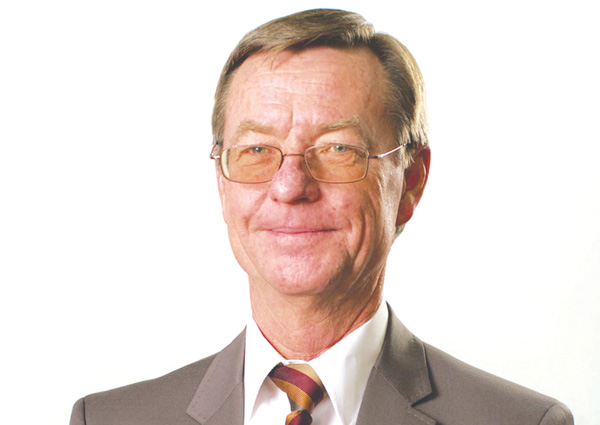
Does only your grandmother or a burglar still need cash?

This was the topic of the speech of Carsten Lange of Delta Secondary School who won this year’s German speakers’ competition held amongst various schools in Namibia. He went through various arguments for and against cash as legal tender. He correctly pointed out that internationally crime is generally not committed by means of cash and concluded in saying that for his part, he would like to continue being able using cash.
I am not sure whether this learner had in mind the Bank of Namibia’s declared intention of doing away with cheques when he prepared his talk. Fact of the matter is that internationally central banks are on a mission to do away with cash. Money laundering, crime in general and being in a better position to track the flow of moneys are the arguments used to push this down citizens’ throats. But is this the real reason behind efforts to do away with cash?
We do know that many central banks across the world have employed rather unconventional policies since the global financial crisis, to avert a collapse of the global financial system, mostly referred to as QE or quantitative easing. The intention was that these money would flow into the economy to generate economic growth and inflation. In addition interest rates were reduced to near zero percent and today are often in negative territory even.
In the process of quantitative easing, global debt of households, business and government increased from 246% of global GDP in 2000 to 269% just before the financial crisis and to 294% by the middle of 2015. The intended results however never realised. Economic growth and inflation so far did not manifest. As the result governments have been unable to wither their debt burden through higher tax collection and the decline in the real value of debt through inflation. Consumers clearly did not take this bait after the financial crisis had taken its toll on many of them after eight years of these unconventional policies having been put to the test. Instead asset bubbles emerged in many market and asset classes while the debt burden is still on the rise. This state of affairs seriously threatens the stability of the global financial system. In a situation like this any over-indebted person would know that he has little room to maneuver and is very exposed to any negative economic development that can bring him out of balance.
So how will governments now be able to maneuver themselves out of their precarious financial position in the absence of economic growth and inflation? Of course one way is to issue negative interest rate bonds as some governments are already doing. But who is going to buy them if you can keep cash in the bank at no cost? But what about if you now also earn negative interest on your cash, i.e. you pay your bank to hold your cash? Of course you would probably think of buying a safe, drawing all your cash from your bank and storing it in your safe at home. This is in fact has been happening in Japan. Is this then the answer why central banks are in the process of effectively outlawing cash, so as to close this loop hole in the monetary system? This could mean that we are now moving to deflation where price and income levels will start to decline. Negative interest rates will at the same time reduce the value of the debt burden. Whilst this mechanism is the opposite of high interest rates and high inflation, the result is the same. There seems to be no alternative really if governments want to avoid being caught off-guard by another global crisis. The problem with deflation though is that it will also not produce economic growth but is more likely to result in recession with unforeseeable consequences for any government. ‘Helicopter money’ is a radical monetary policy option that has been raised in financial media as the possible means to re-ignite economic growth in this environment. An example of such a programme was the trade-in premium that the German government paid for a while to people who bought a new car, which was aimed at stimulating the motor vehicle industry in Germany in the aftermath of the financial crisis. Such policy measures would be charting new waters of which the outcome is unforeseeable. It would undoubtedly cause uncertainty in financial markets and with that, volatility should increase. This backdrop and the possible consequences for global financial market should be taken into account by the investor when redefining his investment strategy.
Conclusion
In considering where to invest in these uncertain times, one can use the analogy of foodstuffs. If you invest in meat you can be fairly certain that you will be able to sell your meat to someone else if you need to sell it. If you invest in an exotic type of fish that only connoisseurs in Japan would eat, you will have to go to Japan to sell your fish or hope to eventually find a customer amongst Japanese tourists visiting your shop. You may then very well make a margin that is much higher than your margin on meat would be. It would require of you that you understand your product and that you know who your customer is. In the same way, an investment in an exotic asset will not really be an option for the ‘man in the street’.
Staying with conventional asset classes thus, equities remain our preferred asset class even under this contrarian scenario illuminated above. The old adage of not placing all your eggs in one basket remains as true as ever. Spread the risk as widely as you can across the world and remember that your biggest assets are in Namibia in all probability, and you have no choice of moving these elsewhere. Discretionary capital that you can move you should consider investing outside Namibia for the sake of spreading risk.
And here I am not even talking about political or even economic risks within Namibia, but it could be a serious devaluation of the Rand that could make it unaffordable to import any essential needs that you may have. As stated before, avoid politically volatile areas which include China, Japan, Korea, Russia, Turkey, central Europe and of course all other countries bordering the Mediterranean.
We also remain of the opinion that an investment in equities should be undertaken on a very cautious and selective basis. The emphasis should be on quality companies generating high cash flows and high yields on your investment with the prospect of high dividends yields. This is really what you need at the end of the day to survive.











































